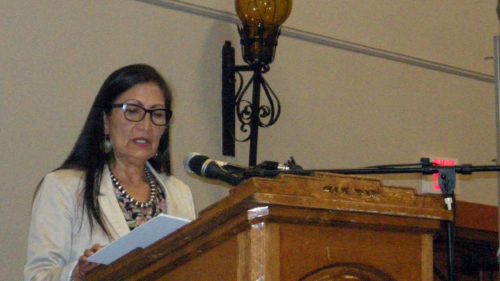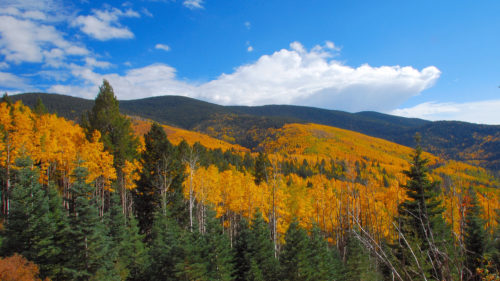The New Mexico Attorney General’s Office says a landowner has failed to open several roads that lead to popular hunting areas on more than 50,000 acres of state lands around White Peak in northeastern New Mexico despite last year’s court ruling that the roads are public.
District Judge Sarah C. Backus of Taos has scheduled a hearing for Thursday morning on an emergency request from the AG’s Office for an order directing landowner David Stanley to remove locked gates, no-trespassing signs and any other obstructions restricting the public from using the roads.
Backus ruled last year that portions of 11 roads across Stanley’s property remained public under a 19th century federal law that holds routes that were public when the federal government owned a property remain public after it passes into private hands.
“Access to and use of our state’s public lands is a crucial part of the cultural heritage of New Mexicans,” Attorney General Hector Balderas said Wednesday in a statement to the New Mexico Wildlife Federation.
“New Mexicans have hunted, fished, camped and spent time on our public lands near White Peak for more than a century,” Balderas said. “And my office will continue to fight for their right to do so.”
Balderas’ office is asking Backus to sanction Stanley by ordering him to pay the state’s attorney fees and the cost of having New Mexico Department of Game and Fish officers investigate the continuing road closures. Balderas’ office filed its motion seeking to get Backus to enforce her order against Stanley in December.
Stanley has filed an appeal with the New Mexico Court of Appeals of Backus’ ruling that the roads are public. The appeal is pending and no hearing date has been set. Attempts to reach Stanley’s lawyer for comment weren’t immediately successful on Tuesday and Wednesday.
In its request for Backus to enforce her order, the AG’s Office stated, “Despite the court’s unambiguous ruling, plaintiff David Stanley continues to maintain locked gates and other obstructions on at least five of the eleven public roads….”
Stanley in late December asked Backus to hold off on enforcing her order while he appeals it. “There is no pressing or immediate need for public access to the roads,” Stanley’s lawyers wrote, adding that the court’s decision would decimate his successful hunting business. Stanley had sued Mora County in 2011 seeking a court ruling that the roads were private.
The AG’s Office included sworn statements from hunters and officers with the New Mexico Department of Game and Fish saying they had encountered locked gates on the property during hunting season last fall that prevented them from reaching the state lands in the White Peak area.
In one statement, Dr. Eldie L. Cruz stated he was elk hunting with family members on Oct. 13, 2018, near White Peak when they were stopped on White Peak Road by a man who identified himself as an employee of Stanley’s. Cruz stated that the employee told them they were on Stanley’s land and had no right to be there. Cruz said that and his family members — his father, son and nephew — left the area.
In another statement, sportsman John Rivera said his grandfather had owned a homestead on the Rivera Mesa, southeast of White Peak. Rivera said that shortly before Thanksgiving, he was traveling on Red Hill Road north of Ocate to reach state trust land, but found the roadway blocked by a padlocked gate.
The state also included statements from officers with the New Mexico Department of Game and Fish who provided photographs of locked gates on several roadways in the area.
Springer resident Ed Olona, a past president of the New Mexico Wildlife Federation, has pressed for public access to the White Peak area. He says it’s critical for hunters and anglers to show their support for continued access to the area.
“The people throughout the state of New Mexico hunt up there. They harvest deer, elk bear and turkey,” Olona said. “This is a very important situation for the state of New Mexico.”
Olona called the area the “Yellowstone of New Mexico.” He said many families have hunted in the area for generations, making annual trips that preserve their traditions and pass on the hunting heritage to youngsters.
“Traditionally this area has always been open for wildlife, and it’s also very important for the sportsmen to keep it accessible,” Olona said. “It’s a good hunting area. We have about 40,000 acres of state trust land that we hunt in the area.”
Litigation over access to the area has run for years, since the first lock went up on a ranch road leading to White Peak in the 1990s. The New Mexico Supreme Court has weighed in repeatedly, addressing road access and other issues. In 2011, the court rejected land swaps in the White Peak area negotiated by former Land Commissioner Pat Lyons.
In 2015, then Land Commissioner Aubrey Dunn proposed the New Mexico Department of Game and Fish purchase 10,000 acres from Stanley for $27 million. Dunn said the game department could then deed the land to his office to buy hunting access to state trust lands for 20 years. The game department determined the proposed deal would be illegal.
In 2017, the Rocky Mountain Elk Foundation helped to open a new road into state lands in the White Peak area that improves vehicle access to approximately 6,000 acres and walk-in access to another 6,000 acres of state trust lands in the White Peak area.



